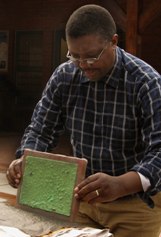
Last week Environmental Education Masters students returned to the ELRC for their third Masters week of the year. While here, they discussed the progress of their current research while participating in a number of creative and interactive workshops. The workshops focused on the sustainability areas of water, agriculture, waste, nutrition and intended to stimulate innovative ideas for teaching environmental education in and outside of the classroom.
At a workshop on recycled paper making, PhD student at the ELRC, Ingrid Schudel said it wasn’t enough to simply sort cans, paper, plastics etc. Schudel stressed the importance of knowing the entire evolution of consumables from their manufacturing to their recycling, including onsite and offsite recycling. “It’s about being aware of the whole recycling process -- understanding where it comes from and goes,” said Schudel. “For instance, we must understand that in South Africa we don’t save trees when we recycle paper. We burn grasslands to create plantations for paper making, so our slogan should rather be: Save paper, save grass and wetlands,” she said. Schudel emphasised the need to reduce the amount of paper that goes into landfill sites and to exercise keener insight when considering how to manage waste, “We also need to look at the socio-economic issues around recycling,” said Schudel, who noted we must consider more than the obvious economic and environmental implications of recycling projects. These initiatives should also be uplifting and dignifying for people in the community, she said.
Lousanne Olvitt, also a PhD student at the ELRC, conducted a workshop on deliberation, using the scenario of creating a nutritious and economically-viable lunchtime meal for learners. Olvitt gave the students a budget, discussed the pros and cons of various processed and non-processed foods and guided students through a cost-benefit analysis in order to choose the best possible meal.
In the area of agriculture, Prof Rob O’Donoghue provided a workshop on natural pest-control. “We need to work out a way to de-criminalise bugs,” joked Prof O’Donoghue, “What we’re trying to replicate here is environmental education as a creative process – what can we do as an alternative to allowing insects to eat our food?” Suggested alternatives to using chemicals were crop rotation and natural crop protection using ash, other insects and plants. “Let children be creative and invent solutions,” said O’Donoghue, demonstrating a bottle experiment showing how a liquid concoction made of garlic juice and boiled tomato plant leaves could be used to discourage insects.
One final workshop on water purification educated the Masters students on various methods for assessing water quality. Amongst other methods, Wayne Peddie WESSA’s project manager for the sustainable commons project, Stepping up to Sustainability, demonstrated the turbidity disk and water quality slide, which uses biotic indicators to reveal the quality of a water source. Peddie revealed the validity of such methods as the SASS 5: “The information from doing this stands in the court of law. It is a scientific way of getting information from animals in water that is legally binding.”
Encouraging the processes of social learning and deliberation while instilling the approach of “teaching outside of the box”, were the primary goals of such dynamic Masters week activities, said Prof O’Donoghue. This is all a part of the ELRC’s larger aim of contributing to the future of environmental education that is both relevant and sustainable.
